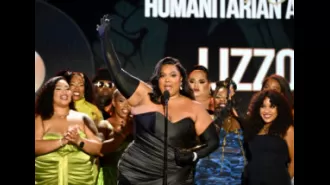A columnist for the Washington Post was fired after posting about Charlie Kirk, feeling silenced by the decision.
Columnist silenced for using voice to defend freedom, challenge power, and reflect on culture and politics with honesty and conviction.
September 15th 2025.

A columnist for The Washington Post recently shared her experience of being fired due to her social media posts about gun control and race. Karen Attiah, the last Black full-time opinion columnist at the media outlet, expressed her frustration in a Substack post on September 15th. She criticized the Jeff Bezos-owned company for terminating her employment because of her social media commentary on political violence, particularly in light of recent shootings in Utah and Colorado.
In her post, Attiah described how she used her column to speak out against issues such as gun violence, and to reflect on cultural and political matters with honesty and conviction. Yet, she found herself being silenced for doing her job. Screenshots of her posts on Bluesky, a social media platform, reveal her strong opinions on America's complacency towards gun violence. She also addressed the issue of white Americans offering "thoughts and prayers" instead of taking real action after such tragic events. Attiah also clarified that one of her posts, which discussed the political assassinations of Minnesota lawmaker Melissa Hortman and her husband, was not about Charlie Kirk, who was tragically killed.
Attiah explained that her post highlighted the pattern of America shrugging off gun deaths and showing compassion towards white men who commit and support political violence. However, the Post deemed her Bluesky posts as "unacceptable" and accused her of gross misconduct, claiming that her words endangered the physical safety of her colleagues. Attiah strongly denies these allegations, stating that there is no evidence to support them and that they are completely false.
She expressed her disappointment with the Post for not even having a conversation with her before firing her, and for claiming that she disparaged people based on race. She believes that this was a rash decision and a violation of the journalistic standards of fairness and rigor that the Post claims to uphold. Attiah also noted that with her dismissal, the Post no longer has a Black full-time opinion columnist, which is a reflection of the lack of diversity in the outlet for a city as diverse as Washington, D.C.
Attiah sees her firing not only as an example of silencing and censorship but also as part of a larger trend of Black voices being purged from various institutions such as academia, business, government, and media. As the country continues to grapple with issues of racism and inequality, Attiah's story serves as a reminder of the importance of diverse perspectives and voices in the media.
In her post, Attiah described how she used her column to speak out against issues such as gun violence, and to reflect on cultural and political matters with honesty and conviction. Yet, she found herself being silenced for doing her job. Screenshots of her posts on Bluesky, a social media platform, reveal her strong opinions on America's complacency towards gun violence. She also addressed the issue of white Americans offering "thoughts and prayers" instead of taking real action after such tragic events. Attiah also clarified that one of her posts, which discussed the political assassinations of Minnesota lawmaker Melissa Hortman and her husband, was not about Charlie Kirk, who was tragically killed.
Attiah explained that her post highlighted the pattern of America shrugging off gun deaths and showing compassion towards white men who commit and support political violence. However, the Post deemed her Bluesky posts as "unacceptable" and accused her of gross misconduct, claiming that her words endangered the physical safety of her colleagues. Attiah strongly denies these allegations, stating that there is no evidence to support them and that they are completely false.
She expressed her disappointment with the Post for not even having a conversation with her before firing her, and for claiming that she disparaged people based on race. She believes that this was a rash decision and a violation of the journalistic standards of fairness and rigor that the Post claims to uphold. Attiah also noted that with her dismissal, the Post no longer has a Black full-time opinion columnist, which is a reflection of the lack of diversity in the outlet for a city as diverse as Washington, D.C.
Attiah sees her firing not only as an example of silencing and censorship but also as part of a larger trend of Black voices being purged from various institutions such as academia, business, government, and media. As the country continues to grapple with issues of racism and inequality, Attiah's story serves as a reminder of the importance of diverse perspectives and voices in the media.
[This article has been trending online recently and has been generated with AI. Your feed is customized.]
[Generative AI is experimental.]
0
0
Submit Comment





